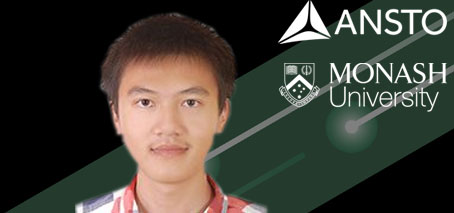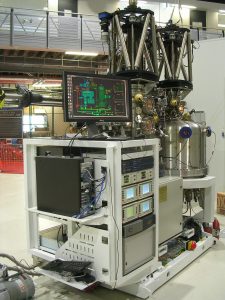
FLEET PhD student Qile Li
Congratulations to FLEET PhD student Qile Li, whose excellent work in probing electronic structures of novel materials has been recognised by an award and scholarship from the Australian Institute of Nuclear Science and Engineering (AINSE).
At ANSTO’s Australian Synchrotron, Qile Li uses Angle-Resolved Photo-Electron Spectroscopy (ARPES) to measure electronic properties of intrinsic magnetic topological insulators.
Intrinsic magnetic topological insulators are a new material class possessing both magnetic and topological states, holding great promise for future electronics.
The materials XBi2Te4 (where X=Mn,V or Eu), and their novel heterostructures with conventional topological insulators such as Bi2Te3, are predicted to be large band-gap Quantum Anomalous Hall Effect (QAHE) insulators that conduct only along one-dimensional, chiral edge states.
“Investigating these materials’ electronic structure will be an important step for realising dissipation-less electronic transport at room temperature – the aim of FLEET’s Research theme 1: topological materials,” says Qile.
“I am using the Synchrotron’s ARPES measurement facility to measure the behaviour of electrons moving through the crystal lattice, which determines the material’s fundamental electronic properties.”
Using ARPES, researchers study electrons emitted from the material as it is bombarded with synchrotron radiation. ARPES measures both the energy and direction (momentum) of the outgoing electrons, which reveals important details of the electronic structure. The technique excites electrons using synchrotron light to drive them outside of the material, and then infers how they were originally behaving inside the material.
The ARPES toroidal analyser, installed at the Synchrotron in 2017 and co-funded by FLEET and ANSTO, allows complementary in-situ growth and characterisation of topological materials.
The PGRA scholarship, which was awarded from a very competitive field, will provide financial and travel support throughout Qile’s PhD, allowing him to get more training and experience on ARPES in Australia and internationally.
Qile Li’s PhD research project is supervised by FLEET AI Mark Edmonds and CI Nikhil Medhekar (Monash University), and by FLEET PI Dr Anton Tadich (Australian Synchrotron).
ANSTO and the Australian Synchrotron are FLEET partner organisations.


